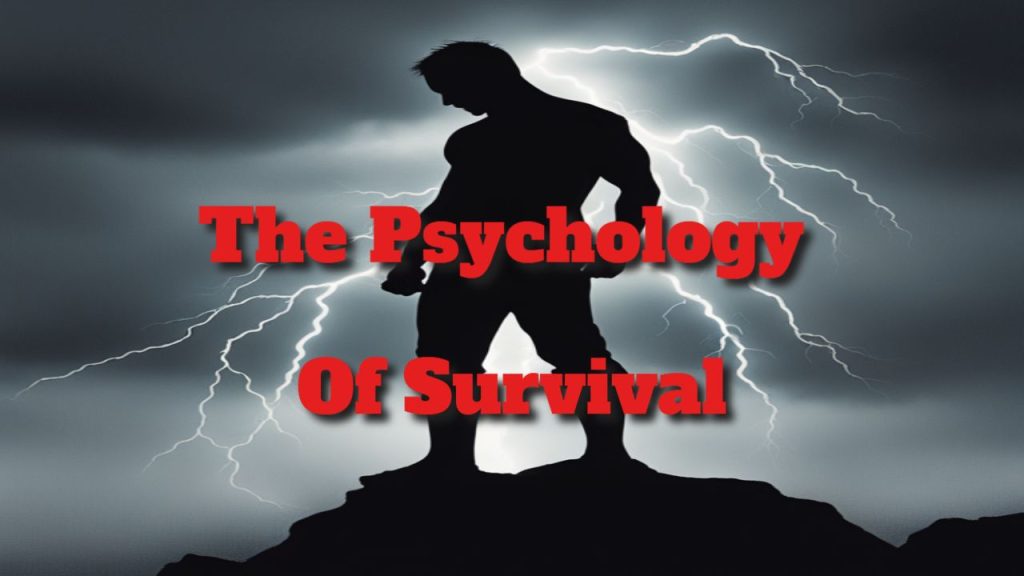Unlock Key Strategies for Mastering Survival Psychology in High-Pressure Situations
The adage “desperate times call for desperate measures” perfectly encapsulates the vital essence of survival, especially as we explore the intricate layers of survival psychology. When faced with intense threats, the human mind undergoes a profound metamorphosis, activating deep-seated reservoirs of strength and resilience that often remain dormant in everyday life. This metamorphosis transcends mere reaction; it represents a comprehensive mobilization of both mental and emotional faculties, showcasing the astonishing capabilities of our minds when challenged by adversity. Understanding these psychological changes is crucial for anyone looking to enhance their survival skills and mental fortitude.
In moments of life-threatening danger, a complex array of psychological mechanisms come into play. What precisely occurs within our minds when every second counts? How do we arrive at pivotal decisions amidst overwhelming pressure? Additionally, how does our innate psychological framework dictate our capacity to withstand, adapt to, and ultimately flourish in chaotic situations? These inquiries are central to grasping the dynamics of survival psychology, which we will delve into throughout this comprehensive article. By shedding light on the fundamental components that empower us to endure under duress, we can extract valuable insights into our own innate capabilities and behavioral responses in crises.
Embark with us on an enlightening expedition into the captivating domain of survival psychology, where we will dissect its complexities and unveil the critical factors that determine our ability to surmount challenges and triumph in life-threatening circumstances.
Exploring the Impact of Fear on Survival Instincts and Reactions
Fear serves as a fundamental aspect of our survival instincts, acting as a primal response that equips our bodies to react swiftly to potential threats. This intense emotion triggers a cascade of physiological responses aimed at enhancing our survival odds during perilous encounters. When fear takes hold, physiological changes occur: our heart rate escalates, breathing accelerates, and muscles tense up, creating a heightened state of alertness that prepares us for immediate action. Understanding this physiological aspect is crucial for anyone looking to improve their survival response.
This acute readiness sharpens our reflexes and promotes rapid decision-making, empowering us to address imminent dangers effectively. Moreover, fear amplifies our sensory perception, enabling us to detect our surroundings more keenly and identify potential threats that might otherwise evade our notice. It urges us to concentrate intensely on our environment, enhancing vigilance and helping us recognize warning signs crucial for survival. Without the presence of fear, our ability to navigate hazardous scenarios could be severely diminished, highlighting its indispensable function in our survival toolkit. By comprehending the interplay between fear and survival mechanisms, we deepen our appreciation for the complexities of the human experience while equipping ourselves with practical knowledge applicable in real-life situations.
Cultivating Resilience to Effectively Overcome Life’s Challenges
Upon experiencing fear in high-stakes scenarios, the ability to harness resilience becomes critical for continuing the fight for survival. Resilience is defined as the capacity to rebound from adversity, adapt to challenges, and recover from setbacks, even in the face of formidable obstacles. This essential quality often differentiates those who surrender to despair from those who summon the inner strength to persist in their survival efforts. Cultivating resilience is a proactive step anyone can take to improve their overall life experience.
However, resilience does not equate to the absence of fear or pain; instead, it embodies the unwavering determination to forge ahead despite emotional turmoil. It involves fostering a positive mindset, setting achievable goals, and adeptly utilizing available resources to navigate hardships. By developing resilience, individuals empower themselves to face life’s hurdles with assurance, equipped with the insight and strategies necessary to triumph. This transformative mindset not only proves advantageous in survival contexts but also enhances one’s broader life experience, instilling hope and enabling individuals to tackle future challenges with renewed energy and resolve.
Improving Decision-Making Abilities Under Pressure for Optimal Outcomes
The capacity to make well-informed decisions can be significantly hampered in high-stress environments. The inherent pressure and urgency characteristic of these critical moments can cloud our judgment, resulting in hasty or poorly considered choices. During stressful episodes, the brain activates a heightened state of arousal, triggering the fight-or-flight response, which can overwhelm rational thought processes and compel individuals to rely more on instinct than reasoned analysis. Recognizing these patterns is essential for developing effective strategies.
This physiological response can impede cognitive abilities, making it increasingly difficult to process information and evaluate the pros and cons of various choices. To counteract these effects, it is vital to understand how stress influences decision-making and to actively employ strategies that mitigate its impact. Techniques such as deep breathing exercises, allowing for brief moments of reflection, or consulting trusted individuals can significantly enhance one’s ability to make informed and effective decisions. By honing decision-making skills in high-pressure contexts, individuals can markedly improve their chances of successfully navigating through challenging and potentially life-threatening situations.
The Essential Role of Social Support in Navigating Crisis Situations
Understanding the significance of social support is crucial for managing stressful circumstances effectively. A robust network of friends, family, and colleagues offers invaluable assistance and resources, enabling individuals to cope and thrive during trying times. The emotional backing, practical help, and sense of community provided by social connections are vital for fostering resilience and enhancing overall well-being. In any crisis, the strength derived from social support can be a game changer.
Research consistently indicates that individuals with strong social networks enjoy better mental health outcomes and recover more swiftly from traumatic experiences. Furthermore, having a support system enhances problem-solving capabilities, presents new perspectives, and provides essential motivation and encouragement. Recognizing the transformative power of social networks during crises can significantly alter one’s experience, allowing individuals to draw strength and insight from others when needed. Engaging with a supportive community not only aids in coping with immediate challenges but also contributes to long-term emotional resilience and recovery, reinforcing the idea that we are not alone in our struggles.
 Implementing Practical Coping Strategies for High-Stress Scenarios
Implementing Practical Coping Strategies for High-Stress Scenarios
What actionable strategies can be employed to successfully navigate life-threatening situations? Here are some effective tips:
– Maintain Calmness and Focus: Take a moment to breathe deeply and evaluate your surroundings before taking action. This strategy can help clarify your thoughts and sharpen your focus.
Prioritize Safety: Protect yourself and others by seeking shelter or moving away from imminent threats whenever possible. Your safety must always be the foremost priority.
– Stay Aware: Remain vigilant to your surroundings, paying close attention to potential dangers or changes in the environment that could impact your safety.
– Communicate Clearly: If necessary, signal for assistance or inform others of the danger you are facing. Effective communication can be crucial in survival scenarios.
– Trust Your Instincts: Rely on your gut feelings and make prompt decisions based on the information available to you. Your instincts can provide invaluable guidance.
– Utilize Available Resources: Maximize the use of all available tools and resources to enhance your chances of survival, whether they are physical tools or social support.
– Maintain an Optimistic Mindset: Cultivate a belief in your ability to overcome the situation. A positive outlook can significantly impact your resilience and responses.
Practical Coping Strategies for Trauma Survivors and Individuals with PTSD
For individuals with a history of trauma or PTSD, implementing effective coping strategies during life-threatening situations is vital for managing anxiety and fostering resilience. Tailoring these strategies can empower individuals to regain control over their responses.
– Practice Deep Breathing Techniques: Employ grounding strategies to stabilize anxiety levels and cultivate a sense of calm. Deep breathing can help center your thoughts and mitigate panic.
– Seek Social Support: Don’t hesitate to reach out to friends, family, or mental health professionals for assistance. Connecting with others can offer critical support during challenging times.
– Engage in Self-Care Practices: Prioritize activities that promote mental and physical well-being, aiding in recovery and resilience building over time.
These coping mechanisms are crucial for managing anxiety and cultivating resilience. It’s essential to recognize that resilience is not merely an inherent trait; it can be actively nurtured through consistent practice and support. With the right strategies in place, anyone—regardless of their background—can enhance their capacity to rebound from adverse situations.
Additionally, understanding how decision-making under stress affects long-term mental health and recovery from traumatic events is paramount. The way decisions are made during high-pressure situations can significantly shape recovery trajectories and overall mental health in the aftermath of life-threatening experiences.
Identifying the psychological barriers individuals face when attempting to seek social support during crises is equally crucial. Common challenges during these pivotal moments may include feelings of vulnerability, fear of judgment, trust issues, and difficulties in expressing one’s needs. Recognizing these obstacles is essential, as they can hinder the process of seeking help and exacerbate stress and anxiety.
To effectively navigate these hurdles and access the necessary support, consider taking manageable steps such as confiding in a trusted friend, consulting a mental health professional, or joining a support group. Remember that seeking help is a courageous step, and there are people who are ready and willing to assist you when you need it most.
Diving Deeper into the Intriguing World of Survival Psychology
The psychology of survival represents a rich and multifaceted area of exploration that offers deep insights into human behavior. While anxiety is a natural reaction to life-threatening events, resilience is what empowers us to recover from adversity and continue moving forward. By comprehending how stress impacts decision-making, we can significantly enhance our chances of survival. Moreover, acknowledging the crucial role of social support provides the essential strength and comfort needed during difficult times.
Utilizing effective coping strategies empowers us to navigate complex and life-threatening situations more adeptly, ultimately leading to enhanced resilience and improved mental health outcomes. This exploration of survival psychology not only enhances our understanding of our own capabilities but also equips us with the practical tools necessary to confront unforeseen challenges with confidence and tenacity.
Common Questions About Survival Psychology Answered
How do anxiety disorders influence survival psychology?
What psychological distinctions exist in survival responses between individuals with anxiety disorders and those without?
Individuals with anxiety disorders may exhibit heightened reactions to fear and stress, whereas those without may engage in more adaptive coping strategies, resulting in varying survival outcomes.
What are the most effective coping mechanisms for trauma survivors or individuals with PTSD during survival scenarios?
The Article Survival Psychology: Understanding the Mindset Appeared First On Survival Avenue.
The post Survival Psychology: Mastering the Mindset appeared first on Survival Bite.
The Article Survival Psychology: Unlocking Your Mental Resilience Was Found On https://limitsofstrategy.com



This piece resonates deeply with me, especially the idea of tapping into our hidden strengths during crises. I’ve often found that intense experiences—whether in the wilderness or facing personal challenges—can reveal unexpected reservoirs of resilience. For instance, I once went through a major life event that forced me to reassess my limits; I realized then that survival isn’t just about physical ability but also about mental agility.
Your reflection on tapping into hidden strengths during crises really highlights something that often gets overlooked. It’s fascinating how intense experiences can not only test our limits but also reshape our understanding of ourselves. When you mentioned going through a major life event that prompted you to reassess your limits, it struck a chord. It’s like a mental and emotional workout that pushes us beyond our usual boundaries.
“Curious to learn more? Click here and dive into an exciting exploration!”
https://wealth-4-ever.com/octopus
Your experience really highlights something crucial about the nature of resilience. When we’re faced with challenging situations, it often forces us to question not just our skills but our entire mindset. It’s fascinating how those intense moments can strip away the layers of what we thought we knew about ourselves.
I appreciate your insights on the impact of intense experiences. It’s fascinating how life’s challenges can unearth those hidden strengths we didn’t even know we had. Your point about survival extending beyond just physical prowess really hits home. Mental agility often plays a crucial role, particularly in high-stress situations.
“I’m glad to hear that the article resonated with you! If you’re interested in exploring more about harnessing resilience and uncovering your inner strength, check out this insightful resource.”
https://wealth-4-ever.com/webilaro
I really appreciate how you’ve tackled the intricate relationship between survival psychology and the human mind under pressure. It’s fascinating to me how, in those moments that feel like they could define our fate, we tap into layers of strength we might never have realized we possessed.
Your exploration of survival psychology highlights the incredible adaptability of the human mind in crisis. I’ve found that understanding these psychological mechanisms not only aids in survival situations but also informs our day-to-day decision-making and stress management.
It’s fascinating to delve into survival psychology and how it reveals the untapped potential within us during high-pressure situations. I’ve always been intrigued by how adversity can act as a catalyst for transformation. For instance, I recently watched a documentary about mountaineers who faced life-threatening conditions on expeditions. The stories of how their minds shifted from fear to a laser-focused determination were striking. They often shared that as the danger escalated, their thought processes simplified, honing in on immediate survival actions rather than succumbing to panic.